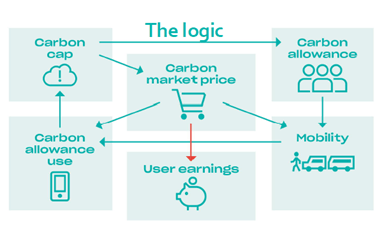Webinar recording: Behaviour change for sustainable mobility

The European Union has committed to achieving a net-zero carbon economy by 2050, which will require, amongst other actions, a shift to clean and sustainable mobility. As well as new investments and financial measures to reduce the use of polluting vehicles, there will also need to be efforts to make people more aware of the negative impacts of their travel choices and change their travel behaviour and preferences, particularly to active and public transport.
On 1 December 2020, the Interreg Europe Policy Learning Platform and the Urban Innovative Actions Initiative organised a joint webinar on behaviour change for sustainable mobility, looking into the activities and results of four projects: two from UIA, which presented their pilot projects for stimulating behaviour change, and two from IE, which focused on a more thematic perspective.
Webinar recording
Webinar agenda overview
Navigate to the discussion topics of interest in the webinar agenda overview below.
00:03:16 The joint webinar was introduced by Katharina Krell, Low-carbon economy Thematic Expert at the Interreg Europe Policy Learning Platform and Ophélie Tainguy, Project and Dissemination Officer at Urban Innovative Actions.
00:10:29 Sophie Gillaerts from the City of Ghent presented data and information provision of the TMaaS Project (Traffic Management as a Service). Access her presentation here.
00:20:46 Q&A In your project you handle a lot of raw data, how complex is it to take the raw data, translate it into information and to gain knowledge out of it?
00:22:32 Q&A Is the anonymised data collected by TMaaS is openly available?
00:23:09 Q&A How do you make sure your data is real time? For example if construction is going on?
00:24:18 Q&A How do you measure the behaviour change from your project?
00:27:54 Maria Mourfoulaki from the Centre for Research and Technology Hellas, focused her presentation on marketing techniques for shifting users willingness to travel by sustainable transport means, from the E-smartec project (Enhanced sustainable mobility with marketing techniques). Access her presentation here.
00:42:45 Q&A How ready did you find administrations to open up internal processes towards citizens?
00:45:22 Q&A How do you get data from private operators when they have already penetrated the private market when they were not required to share data?
00:47:54 Q&A The apps rely on people being digitally literate and having access to smart devices. How would you involve those that are not so tech-savy?
00:49:49 Q&A How do you deal with conflicts in city-planning? Do you have experience with such conflicts?
00:53:36 Anna Huttunen from the City of Lahti spoke about promoting sustainable mobility through citizen engagement (CitiCAP project, Citizen's cap-and-trade co-created). Find her presentation here.
01:08:32 Q&A What would you advise another city that wants to implement a similar solution to follow and avoid?
01:11:33 Q&A Do you a system of carrots and sticks or only carrots? Is there a penalty when they exceed their carbon budget?
01:12:18 Q&A How do you detect the mode of transport that is being used and how do you avoid this being manipulated? And do you apply this to car-sharing and taxis?
01:16:00 Kamila Dobek from the Adam Mickiewicz University Foundation, Poznan Science and Technology Park presented how to incentivise behaviour change through good practices from the PE4Trans project (Public Engagement for Sustainable Public Transport). Find her presentation here.
01:34:19 Q&A Different people have different values, how do we find which people have which values and how deep do you need to go to differentiate between these target groups?
Panel discussion
01:38:15 Q&A Are there any low-hanging fruits in the area of behaviour change? Any no-brainers that really any city should implement? And where to start from when designing behaviour change measures?
01:43:09 Q&A In many European cities temporary changes related to urban mobility due to COVID-19 are now becoming more apparent or even permanent. How do you see these changes in your city/region? And how did they affect behavioural change?
01:48:30 Q&A How do you intend to feed urban mobility policies with this project?
Key learnings
Data and information
The first session of the webinar focused on mobility management systems, bringing together and harmonising data from different sources, making it available to users, and supporting data exchange between authorities and citizens. Sophie Gillaerts from the City of Ghent presented the TMaaS project and the Link.Gent platform which provides realtime, personalised, multimodal information to convince citizens to make sustainable mobility choices. The platform aggregates data from public and private partners, and can send notifications to registered users (SMS and email) to notify them about disruptions and offer alternate routes.
Maria Mourfoulaki from the Centre for Research & Technology, Hellas presented key lessons and practices from the e-smartec project, exploring citizen-authority data exchange. The project has identified a number of ways for influencing stakeholders and citizens, but also of collecting data and inputs to co-design effective interventions. The project identified four levels of participation with corresponding actions and good practices, which can provide inspiration for other regions. Further information can be found in the e-smartec 'Handbook on marketing techniques'.

Incentives for behaviour change
The second session explored how to motivate and incentivise citizens to change perceptions of their everyday mobility and how to develop transport systems that can facilitate the change. Anna Huttunen from the City of Lahti started the session by presenting the CitiCAP project, which has created the world’s first city-wide pilot for Personal Carbon Trading (PCT). The scheme involves a mobile app which will calculate a weekly carbon budget for the user (based on a number of factors), and then monitors mobility to determine the user’s carbon usage. Savings made can then be converted into credits, which will be redeemed for benefits from local businesses.

However financial incentives alone are not the only motivators of change, values and beliefs can also be strong incentives for change. Kamila Dobek from Poznan Science and Technology Park presented lessons from the PE4Trans project. The project has worked with citizen panels to develop action plans, working from the visions and values of citizens related to carbon reductions, health, safety, quality of life, nature and people. The project methodology involves determination of the factors why people may want to change, what prevents change, and puts forward targetted interventions to overcome these blockages.
Key messages and conclusions
The presentations and resulting discussions resulted in the number of key conclusions for regions looking to support behaviour change.
- Behaviour change does not happen overnight but requires step-by-step development towards a defined long-term goal;
- Consistent and constant messaging is required, firstly around the need for change, then around ways to achieve it, making use of data for informing and consulting, but also co-desgin and collaborative planning;
- The process must involve a two-way exchange of data and information; what do citizens really need, and what can authorities offer?
- A good starting point for any city is to target behaviour change actions towards children, particularly related to school mobility. This can set long-term behaviour and also influence parental behaviour;
- A combination of measures is needed, including infrastructure development. Safety must be ensured before most people will be active;
- Be inclusive – target all groups. Take time to really understand the needs and concerns of target groups and design interventions with them, with frequent reinforcement.
Further reading and resources
- Read the UIA final report on innovation in urban mobility, available here, soon.
- Discover the Policy Learning Platform’s peer review service to get tailored recommendations for your region;
- Watch Anna Huttunen, Citicap project manager, explain more about Lahti’s project.